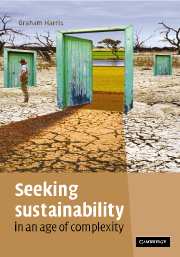Book contents
- Frontmatter
- Contents
- Acknowledgements
- 1 Preamble: the world we are in
- 2 Complexity and complex systems
- 3 New science, new tools, new challenges
- 4 The complexity of ecology
- 5 The generation of complexity
- 6 Micro-interactions and macro-constraints
- 7 A sense of place
- 8 Created landscapes and our changing sense of place
- 9 Catchment form and function
- 10 Catchment loads: ecosystem impacts
- 11 Change detection, monitoring and prediction
- 12 Evidence, uncertainty and risk
- 13 Modified landscapes: biodiversity
- 14 Function in fragmented landscapes
- 15 Environmental flows
- 16 Evidence for global change
- 17 Values and beliefs
- 18 Managing environmental, social and economic systems
- 19 Linking multiple capitals in a changing world
- 20 Community, capacity, collaboration and innovation
- 21 A new environmental paradigm
- 22 Emergent problems and emerging solutions: developing an ‘ecolophysics’?
- 23 Avoiding collapse
- Index
2 - Complexity and complex systems
Published online by Cambridge University Press: 21 March 2011
- Frontmatter
- Contents
- Acknowledgements
- 1 Preamble: the world we are in
- 2 Complexity and complex systems
- 3 New science, new tools, new challenges
- 4 The complexity of ecology
- 5 The generation of complexity
- 6 Micro-interactions and macro-constraints
- 7 A sense of place
- 8 Created landscapes and our changing sense of place
- 9 Catchment form and function
- 10 Catchment loads: ecosystem impacts
- 11 Change detection, monitoring and prediction
- 12 Evidence, uncertainty and risk
- 13 Modified landscapes: biodiversity
- 14 Function in fragmented landscapes
- 15 Environmental flows
- 16 Evidence for global change
- 17 Values and beliefs
- 18 Managing environmental, social and economic systems
- 19 Linking multiple capitals in a changing world
- 20 Community, capacity, collaboration and innovation
- 21 A new environmental paradigm
- 22 Emergent problems and emerging solutions: developing an ‘ecolophysics’?
- 23 Avoiding collapse
- Index
Summary
The characteristics of complex adaptive systems and networks, and an introduction to emergence and emergent properties
What is emerging from the shadows is a new future, one which, instead of having dominion over nature, works with and mimics many natural functions and processes. We are beginning to focus on water recycling and reuse, just as the biosphere has been doing since time began. We are beginning to find ways of lifting water, nutrient and energy use efficiency to levels comparable to those found in natural systems; and we are beginning to recycle more raw materials and find more and more renewable energy resources. The question is: instead of security and domination, can we find a new resilience in the face of global constraints, and of complexity, change and variability? To do so will require a new approach to complexity and change and a new view of the interactions and relationships between individuals, communities and institutions that allows of greater flexibility, adaptiveness and collaboration. Epistemology and science are changing also; what we know, how we know it and what we do with the knowledge we have already changed irreversibly. Not all the experiments have been, or will be, successful, but the trends are clear.
We are hedged about by sunk costs and by semiotics: the cultural baggage we carry and the signs and symbols we use to conceptualise, describe, model and manage things.
- Type
- Chapter
- Information
- Seeking Sustainability in an Age of Complexity , pp. 19 - 27Publisher: Cambridge University PressPrint publication year: 2007



